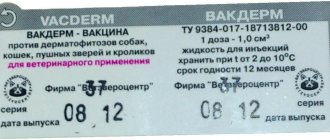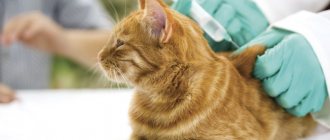Worms are dangerous to the health of not only the cat itself, but also for its owners. Therefore, the list of important and necessary procedures includes deworming measures.
Let's look at how to deworm a cat at home, which anthelmintic drugs are the most effective and safe, as well as how to properly draw up a preventive action plan.
Why is deworming necessary?
Deworming is a set of actions and measures that are aimed at ridding an animal of worms and preventing its re-infection. Secondary invasion is more than likely because the development cycle of helminths from egg to adult is about 4 months.
During cat hygiene procedures, the possibility of infection with worms is 100%. Therefore, it is necessary to deworm a cat often - at least 3-4 times a year.
Infection with worms is the most “popular nuisance” even among domestic cats. In fact, this serious problem can cause significant damage to your pet's health.
In the process of development and reproduction, worms feed on the tissues of internal organs, the blood of the animal, disrupt the functioning of the gastrointestinal tract, and undermine the immune system.
An infected cat becomes a source of danger for family members. Children are especially defenseless against helminthic infestations. To protect the family from infection, a domestic cat should be dewormed regularly and not wait for obvious manifestations of the disease.
A few more reasons why it is necessary to worm your pets systematically:
- cats are constantly infected with worms: when they eat raw meat, fish, offal, pick up pieces of food from the floor, and also during cat washing;
- waste from worms poisons the body of an infected cat and undermines its health;
- some worms are able to overcome the placental barrier and infect kittens in utero, this often leads to the birth of weakened offspring or their death;
- infected cats are emaciated, stunted, and suffer from anemia.
Why do you need to worm?
Once in the animal's body, helminths poison it, damaging many internal organs. If you do not regularly give anthelmintic to your cat, the parasites will form a whole ball of worms in the intestines, which will constantly grow. When the ball reaches a large size, the intestines can rupture, which leads to the inevitable death of the animal.
The parasites eat all the beneficial substances, and the cat begins to experience a deficiency in essential vitamins and microelements. Parasites can live in the kidneys, liver, lungs, heart, which leads to disruptions in the functioning of these organs. The cat's immunity decreases and he is often exposed to infectious diseases.
The helminths present in a cat can be easily transmitted to people, which is dangerous, especially for children. Veterinarians recommend deworming a cat immediately after bringing it into your home and repeating the procedure periodically. This will help maintain the health of the animal and the people around it.
Symptoms of the presence of worms
In domestic cats, helminthic infestation most often occurs through the gastrointestinal tract: during eating or by licking. Subsequently, the worms “develop territories” in accordance with their belonging to a particular species.
Adults can live and feed in one organ, and lay eggs in another. With helminthic infestation, worms can affect not only parts of the intestines, but also the liver, heart, lungs, and brain.
Worms take nutrients from the body, negatively affect the functioning of internal organs and systems, and poison the cat with toxins and waste products of their vital activity.
The insidiousness of the invasion is that in the initial stages it is difficult to determine the presence of the disease by the appearance and well-being of the cat. That is why veterinarians strongly advise worming your cat regularly, regardless of external manifestations.
Clearly expressed symptoms of infestation appear when the body is seriously affected by worms:
- The first and main way to determine whether a cat has worms is to monitor its stool. Tapeworms can be seen in feces with the naked eye. They look like grains of rice.
- The fur becomes dull. Significant hair loss may occur. This occurs due to lack of nutrients.
- An indomitable appetite appears. The cat is forced to feed not only itself, but also the worms.
- As another scenario, loss of appetite is a consequence of intoxication of the body.
- Bloating, constipation, vomiting, flatulence. There are so many worms that they block the gaps in the intestines and interfere with the passage of food. It is even possible that the intestinal wall may rupture.
- The cat suffers from itching in the area of the anus. She often licks and bites this place, injuring the delicate skin.
- The gums and mucous membranes of the mouth are pale. This is a sign of anemia that was caused by an infestation.
- Apathy and drowsiness. Worms take energy from the animal in the process of disrupting the functioning of internal organs.
- Weight loss against a background of visible well-being.
Infestation of individual organs by worms can be determined by characteristic signs:
- worms in the liver - yellowing of the mucous membranes: eyes, eyelids, mouth;
- vessels and membranes of the brain are invaded - purulent discharge from the eyes;
- lungs are affected - cough, nasal discharge.
Common symptoms
To prevent your pet from suffering from terrible pain, you must immediately react to the following external signs that occur if worms live in the cat’s body :
- the mucous membrane turns pale or yellow;
- weight drops sharply;
- the appearance of shortness of breath, cough;
- the coat is dull and tousled;
- decreased appetite or refuses to eat at all;
- Meows very often, and suddenly.
If your cat has a massive infestation of parasites, then just look at your pet's feces and see these worms. If you do not rid the animal of worms in time, it may die.
© shutterstock
Sources of parasite infection
Most owners of domestic cats are confident that if their pet does not walk outside and does not communicate with other animals, then it cannot become infected with any parasites. This, unfortunately, is not the case - not even the most protected cat is immune from infection with ecto- and endoparasites (worms).
There are countless sources of helminth infection. A person can bring several types of worms into an apartment on street shoes. Larvae, eggs, cysts and even living organisms can be found on the surface and in the tissues of raw meat, fish, in water - in puddles, in a river. Some types of worms are carried by fleas and other blood-sucking animals.
Parasitic infestation of pets is almost inevitable. It's not even about avoiding invasion. The point of deworming is to prevent worms from multiplying and expel them from the body in a timely manner. Therefore, it is necessary to worm cats regularly.
Methods
Every owner should know how to properly deworm cats with different drugs. Some animals calmly eat food to which the medicine has been added. But if you can’t feed the cat this way, then there are other methods.
A calm animal should be seated nearby, its mouth should be carefully opened and the tablet should quickly be placed far away on the tongue. After this, the mouth is closed and, lightly stroking the pet’s neck, they force it to swallow the medicine.
But if the cat behaves restlessly, then the tablet must be crushed and diluted with water. The resulting suspension is drawn into a small syringe without a needle. The animal is wrapped tightly in a towel, its mouth is opened and the drug is injected into the cheek. The cat is released only after it has swallowed everything.
It is convenient to deworm an animal using drops. They are applied to the withers so that the cat cannot reach them with his tongue.
A veterinary clinic can give you an anti-worm injection.
Types of helminths in cats
In order to properly deworm a cat, it is necessary to find out what type of worms it is affected by. This issue is solely within the competence of the veterinarian. Only he can determine the type of parasite, prescribe adequate treatment and select appropriate medications.
The most common types of endoparasites:
- Roundworms: roundworms, hookworms, nematodes. The small intestine is affected. This type of worm is most common in cats. Even newborn kittens can become infected with them through their mother's milk. Adult cats become infected through feces. These worms secrete a toxin that poisons the animal's body. They block the bile ducts, affecting the heart and lungs. They lay eggs around the anus, which causes unbearable itching.
- Tapeworms (flatworms) are cestodes. Cats can become infected with them through raw meat. Fleas can also be carriers of cestodes. Their habitat is the intestines. The “family” of these worms is a ribbon up to 70 cm long, which consists of segments with larvae. Some parts may be passed out in the stool. These worms often cause intestinal obstruction, which often leads to the death of the animal.
- Flukes are trematodes. The most dangerous worms, the main “tool” of which is powerful suction cups. With their help, flukes are able to gain a foothold in the heart, lungs, and liver and suck the life out of these organs. Flukes cause diseases such as paragonimiasis and opisthorchiasis. Sources of infection can be raw fish and untreated water.
When to carry out processing
There is no doubt that anthelmintic measures should be carried out when the first signs of infestation are detected. In this case, you cannot hesitate: the sooner treatment begins, the fewer risks to the cat’s health.
Modern anti-invasive drugs make it possible to deworm kittens from one month of age without harm to their growing body. A responsible owner will strictly adhere to the preventive worming schedule - once every 3-4 months. These activities should be continued throughout the pet’s life.
Quite often situations arise when an extraordinary procedure is necessary. You will have to worm your cat:
- at least 10 days before the intended mating;
- at least 10 days before scheduled vaccination;
- 3–4 weeks before sterilization or castration surgery;
- after the end of lactation of a nursing cat.
New deworming remedy "Polivercan"
Some owners begin to deworm cats with a drug such as Polyvercan. This medicine has recently appeared on the consumer market and is beginning to be in demand. The peculiarity is that it is in the form of sugar cubes. Dogs love to eat it, so it is quite easy to deworm them with this drug.
Poliverkan
The best anti-helminth remedies
Modern veterinary pharmacology offers a fairly wide range of anthelmintic drugs. They differ from each other in their focus on a specific type of worm, in the method of influencing them, in the form of release.
The action of anthelmintic drugs is as follows:
- they have a detrimental effect on the nervous system of worms;
- have a paralyzing effect;
- slow down and stop metabolic processes in the body of the worm;
- literally “dissolve” helminths.
We offer the top 10 most effective and proven drugs for worming domestic cats.
| Name | Spectrum of action | Release form | pros | Minuses |
| Albendazole | Against liver flukes | Powder, tablets | High efficiency | Precise dosage required. Toxic |
| Dirofen | Destroys tapeworms and roundworms | Suspension | Quick effect, few contraindications | |
| Drontal | Target – round and tapeworms | Pills | Allowed for pregnant cats and kittens. No adverse reactions Can be used as a prophylactic agent | |
| Kanikvatel Plus | Against round and tapeworms | Pills | Acts quickly, effectively, and is gentle on the cat’s body | |
| Pirantel | Destroys hook and tapeworms | Pills. Suspension | Can be used by pregnant and lactating cats | Side effects: lack of appetite, vomiting, diarrhea |
| Piperazine | Effective against roundworms, hookworms | Powder. Pills | Quickly eliminated from the body | Narrowly targeted action |
| Poliverkan | Wide spectrum of action. Effective against nematodes and cestodes | Soluble tablets | Allowed for kittens from 1 month | Prohibited for pregnant cats |
| Prazitel | Wide spectrum of action | Pills. Suspension | Safe for kittens, pregnant and lactating cats | Low efficiency |
| Prazicide Plus | Kills flatworms and nematodes | Suspension. Pills | One application is enough | May cause intolerance |
| Profender | Wide spectrum of action | Drops on the withers | Convenient to use. High efficiency | High price |
Pharmacologists are developing more and more new drugs against worms with a wide spectrum of action - low toxic and safe for the animal. The table provided will help the amateur navigate a large number of offers, but in no case does it imply an independent selection of the drug.
There is an opinion that folk remedies - herbal decoctions, crushed seeds - are better than pharmacological drugs. This is not true: herbs can be just as dangerous and toxic.
When treated with traditional methods, it is more difficult to maintain the dosage. This path is much longer and requires more time and effort, which does not always lead to the desired result.
Expert opinion
Chepa Natalya Semenovna
Veterinarian
Ask an expert
I would like to add two more drugs to the list of antiparasitic agents recommended for deworming. The first, Milbemax (beef-flavored tablets), is prescribed for the treatment and prevention of cestodiasis and nematodes (dipylidiasis, toxocariasis, dirofilariasis, etc.). Available in two forms: for kittens and small cats and for large cats. The second drug is Stronghold drops on the withers. Stronghold acts against intestinal roundworms, dirofilariasis and external parasites (fleas, ear and scabies mites, lice). Please note that the drug is not used for the prevention and treatment of helminthiasis caused by tapeworms. Available in three forms: for kittens weighing up to 2.5 kg, for cats weighing 2.6 - 7.5 and over 7.5. Both drugs are used by animals from 6 weeks of age and are approved for pregnant and lactating women.
Treating cats at home
All anthelmintics can be divided into the following two types:
- broad-spectrum drugs;
- a single-component drug that is aimed at one action.
Preparations for worms of the second type destroy only a specific type of parasite. A wide range of medications are used to combat mixed type invasion. Only veterinarians can prescribe the correct medicine for parasites. Before you start treating worms at home, you still need to take your kitten to the clinic.
Rules for the use of drugs
The procedure for expelling worms does not require keeping the cat in a hospital. Modern drugs allow you to deworm a cat at home. Only a veterinarian can prescribe the drug after examining the animal. Based on the results of the tests, the specialist will determine the type of worm and the degree of damage, and then recommend the appropriate drug and its dosage.
The drug is given to the cat once, it is better to do it in the morning, before meals. After 2 weeks, the medicine is given to the animal again at the recommended dose. After a few days, you should take tests and visit a doctor to confirm the success of the worming procedure.
Taking the drug alone is not enough. It is necessary to rinse the litter box after each cat's use of the toilet, and frequently wash and disinfect her sleeping mat.
The drug is taken depending on the form of its release. It is convenient to give drops and suspensions directly into the cat’s mouth from a pipette or using a syringe without a needle. The drug should be instilled or poured into the cat's cheek.
The tablet should be crushed and dissolved in a small amount of water. You can pour the powder into the mouth - on the root of the tongue. Then you should close the cat’s mouth and stroke its throat, thereby forcing it to swallow the drug.
The cat does not like this procedure, so you will have to use force: experienced cat breeders advise swaddling it tightly to avoid scratches. It is imperative to make sure that the medicine is “as prescribed.”
The drug can be mixed with food. However, this method does not always work: cats sense the slightest impurities in food and refuse to eat.
General rules for the use of anthelmintic drugs
The drug is given to the cat in the recommended dosage, usually in the morning - you do not need to tie the use of the drug to meals, but to reduce the likelihood of side effects, it is better to give the drug before meals . Almost all modern medications are given to the animal once; repeated administration is necessary after 10-12 days. After the procedure, it is advisable to take tests and show your pet to a doctor to make sure that the parasites are destroyed.
Along with the use of anthelmintic therapy, it is necessary to observe the rules of hygiene - wash the tray immediately after the cat goes to the toilet, thoroughly clean the places where it sleeps and eats, and also treat them with disinfectants.
Video - How to worm a cat
How to give a cat medicine
Most likely, it will not be possible to persuade a cat to take medicine, so the owner of the animal needs to choose one of the options - to act by force or by cunning.
Method number 1 . The medicine should be mixed with the pet’s favorite treat (the tablets should be crushed into powder beforehand) and the pet should be given a “cunning” dish to eat. Canned foods are best suited for these purposes: pates, mousses and other products that have a puree-like consistency. The disadvantage of this method is that the cat will never eat the treat if it smells foreign impurities in it.
The best canned food for cats
Method number 2 . Use a special device called a piller or a regular syringe without a needle to take the medicine. The drug should be taken into a syringe (crush the tablets and mix with a small amount of liquid) or fix the tablet in a piller, then place it on the root of the animal’s tongue, squeeze the jaws and stimulate swallowing by stroking it along the throat. It is better to carry out this procedure together with an assistant, the downside is the likelihood of revenge on the part of the offended pet (in retaliation for violence, some cats may tear clothes or furniture, urinate in shoes, etc.).
Special device - peeler
Important! When deworming, minor side effects are allowed in the form of salivation or gastrointestinal disorders, which go away on their own within 1-2 days. If your cat has a fever, lethargy, pain or other alarming symptoms, you need to show her to the veterinarian, and in the future, choose a different anthelmintic drug.
Video - How to give a cat a pill
Folk remedies for worms in cats
Traditional recipes for the treatment of helminthic infestations in cats are considered safer for health than pharmaceutical drugs, but in reality this is not the case. They can also cause side effects and negatively affect the health of the pet, and, in addition, their effectiveness is several times lower than that of medications.
- Pumpkin seeds. Take 5 g of peeled pumpkin seeds, chop, mix with the same amount of lard or vegetable oil, and then feed the mixture to the cat. Repeat the procedure for 5 days in a row, and a new portion of the medicine must be prepared daily.
Pumpkin seeds
- Onion. Divide an ordinary onion into parts, pour a glass of well-boiled water, and let stand for half an hour. Give the resulting liquid to the animal on an empty stomach, 1-2 tablespoons for a week.
- Garlic. Grind one clove of garlic and mix it into cat food, feed the cat one clove of garlic once a day for 7 days.
Onions and garlic have anthelmintic properties
- Tansy. Take a tablespoon of the dried plant, pour a glass of boiling water, leave for an hour, then filter and give the cat the infusion 2-3 times a day on an empty stomach. You should feed your pet no earlier than an hour after taking the medicine.
- Carrot. Carrot juice for deworming cats is used as an enema - inject 20 ml of freshly squeezed juice into the cat's anus every day, for a course of 7 days.
carrot juice
Attention! If helminths have caused intestinal blockage or any other serious complications, you cannot carry out treatment on your own - in such cases you should immediately contact a veterinary clinic.
Is deworming necessary before vaccination and sterilization?
If a healthy animal has to undergo a planned surgical intervention (sterilization or castration), it is necessary to provide him with conditions for a speedy recovery. The body of a cat affected by worms is weakened, so the risk of postoperative complications is high.
Worming your pet before surgery is a necessary and mandatory measure to protect its health.
Vaccination is also carried out only for absolutely healthy cats. Worm infestation is one of the contraindications to vaccinations. Regardless of whether symptoms of worms are present or not, it is necessary to worm your pet before vaccination.
If a young cat is to be sterilized, the presented scheme of prevention, routine worming and vaccination will be very useful:
- at the age of 2–3 months, kittens receive their first vaccination; the cat should be dewormed at least 10 days before vaccination;
- After about a month, re-vaccination is carried out;
- after changing teeth, kittens are again supposed to be dewormed, and after 10 days they undergo a routine vaccination;
- after 2–3 weeks, if the animal is in good health, a sterilization operation is performed.
Deworming a pregnant or lactating cat
Some types of worms are able to penetrate the placenta of a pregnant cat and infect embryos. To avoid infestation of the offspring, the cat and male male must be wormed at least a month before the intended mating. This condition is mandatory, regardless of whether the cat has been wormed as planned or not.
You should know that pregnancy and lactation (the period of feeding kittens) are contraindications to taking anthelmintic drugs. All of them are toxic and can cause congenital deformities in unborn kittens or lead to miscarriage.
If worms are found in a pregnant cat, and this noticeably worsens her condition, she will still have to be dewormed, despite the possible risks.
There are medications that are allowed for pregnant cats:
- Drontal, Dirofen – used only in the second half of pregnancy;
- Profender can be given in the early stages of pregnancy, except for the last three weeks.
Only a veterinarian should prescribe the drug. There is no point in resolving this issue on your own.
How to deworm pregnant cats and kittens
The need to deworm a pregnant cat arises if the owners were irresponsible about preventive deworming, which led to the development of helminthic infestation. Almost all drug manufacturers do not recommend the use of anthelmintics at this time. Either the drug is known to be toxic to embryos, or studies have not been conducted to determine this effect. Therefore, when it is necessary to save the life of a cat, neglecting the fate of the kittens, deworming is carried out under the supervision of a veterinarian.
Be sure to read:
When to worm kittens for the first time: for what, at what age is it better, how to do it correctly, the best drugs
Most anthelmintic drugs pass into milk; their effect on kittens younger than three weeks of age has not been studied. Therefore, lactating cats are not dewormed during this period. Deworming of kittens up to 6 weeks of age is carried out strictly according to indications, and only approved drugs are taken.
The first deworming is carried out 10 days before vaccination of eight-week-old cubs.
Toxocara feline











